Georges de Nantes.
The Mystical Doctor of the Catholic Faith.
13. PARISH PRIEST OF VILLEMAUR
ON September 14, 1958, we sang the first vespers of Our Lady of Seven Sorrows in the stalls of the marvellous church of Villemaur, where our Father exercised his ministry for five years with unequalled zeal, characterised above all by his assiduity in teaching his people to pray, “ which is the most difficult task in a time when irreligion dominates societies, ” as he wrote in our Provisional Rule (Art. 116).
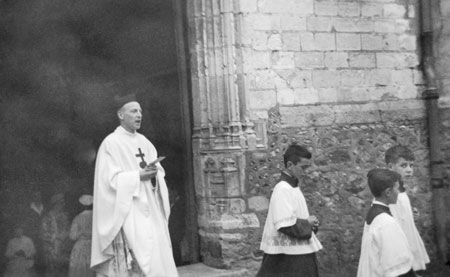
The foundation of the Little Brothers of the Sacred Heart of Villemaur, on the centenary of Charles de Foucauld’s birth, put down roots in full communion with the Church under the staff of Bishop Le Couëdic of Troyes, but also in the legitimate hope of a national awakening, as he reminded this bishop :
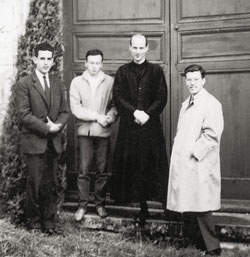
“ September 1958 ! In France, public opinion awoke to acclaim General de Gaulle, who promised to save French Algeria and to stand in the way of the world Communist revolution. In the Church, Christian peoples unanimously followed with sorrow and veneration the final illness of Pope Pius XII, the Pastor Angelicus. It was a period of calm and even of recovery. The air was cleared. ” 1
Brother Gérard and I returned to the Carmelite Seminary in Paris to do the third year of our studies for the philosophy degree, while Fr. de Nantes had two tasks in hand : leading the life of a ‘ monk-missionary ’ according to Fr. de Foucauld’s ideal and carrying out the ministry of a ‘ monk-parish priest ’ like that of Fr. Emmanuel, the holy founder of the work of Our Lady of Holy Hope at Mesnil-Saint-Loup, the parish closest to Villemaur. Its parish priest became Fr. de Nantes’ friend and confessor. “ The Mesnil pilgrimage has remained in my heart, ” 2 he said and he would go there often.
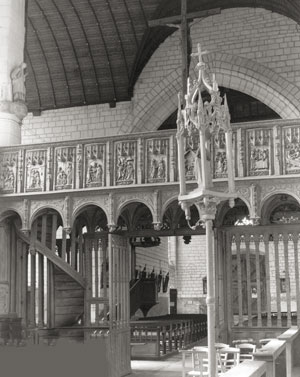
He recited the Divine Office in his stall in the chancel of Villemaur’s church. One night, a police patrol saw light in the church and suspected burglary. The church was endowed with a rich and precious treasure. The policemen deployed themselves, opened the door and found the parish priest reciting Matins !
During fifty years day and night, our Father unrelentingly recited the monastic office, drawing from it “ food for his devotion ” and the strength to accomplish his immense labour.
THE CARE OF THE FLOCK.
From the first days, he undertook to visit all his parishioners, including the retired railwayman who agreed to welcome his ‘ new parish priest ’ for the first time, on condition that it be the last.
At Max’s place, it was different :
“ He used to come to the house to have lunch or dinner. ‘ My housekeeper is away, ’ he would say. We received him ; we were happy to do so. It was Father. I would say to Pierrette : ‘ Hey ! Father is coming to eat at noon. ’ She would put another piece of meat into the pot and that was that ! There was no fuss : the priest came.
“ Moreover, he ate rather rapidly : the calendar or the schedule was timed down to the last second. Besides, he was always a ‘ man of action. ’ ” Nevertheless, “ it was always easy to talk to him ! ”
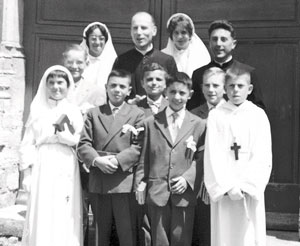
Like St. Francis de Sales in the Chablais, he inaugurated a Letter to Parishioners that was sent to everyone, whether they liked it or not ! Finally, by dint of expending all his energies with an alacrity that filled the best people with enthusiasm, he won the good will of his three parishes. Every day he celebrated the Holy Sacrifice, usually at Villemaur. On Sunday he sang High Mass with a sermon at Planty at 8:45, at Pâlis at 9:45, at Villemaur at 11 and in the afternoon : Rosary at Planty followed by a sermon and Benediction of the Blessed Sacrament ; Vespers at Pâlis, with sermon and Benediction of the Blessed Sacrament ; Compline at Villemaur after the short, more intimate evening sermon.
One Sunday at harvest time when he was going from one parish to the other, he noticed in a field a pile of sacks of wheat that had been abandoned there. The weather was threatening. Immediately he went to the house of the owner, a Protestant, whose name was Boss, to inform him. Sententiously, he replied :
“ Father, on Sundays, one does not work. ”
“ The good God did not give you all this grain for it to be wasted ! ”
He then went to fetch other farmers who convinced Mr. Boss to bring in his harvest with their aid, and Father’s !
THE POPUARITY OF HIS SERMONS.
He preached with authority and simplicity :
Thus, on the first Sunday of Lent, February 15, 1959 : “ Do not be too attached to the goods of this world to the point of forgetting your duties to God. Let us not convince ourselves that we are beyond God’s justice, sure of His mercy, as though he owed it to us. Let us beware of the Devil who tries to make us deny God, supposedly to gain possession of all the goods of earthly life. ”
To the parishioners of Pâlis he said, without circumlocution : “ Brethren, when I arrive at the summit of the hill and I see the village before my eyes, I see the demons that hover above your homes. ”
For the second Sunday of Lent, he exhorted them to make resolutions “ of prayers, penances and efforts to acquire virtues, ” and to write them down. The following Sunday, he asked at the beginning of the sermon, after the prayers for the deceased : “ Are the resolutions put down on paper ? ” Then he prepared his parishioners for Holy Week : confessions, Lenten directives and also an explanation of the liturgy.
“ I think that you like beautiful ceremonies that are a delight for the eyes and the ears. ” he wrote in his first Letter to Parishioners. “ The heart is stirred, forgets the miseries and the disappointments of the earth in order to open itself to the hope of Heaven and to believe in God’s paternal goodness for His creatures. I will do my utmost to make our feasts beautiful. ”
They were magnificent, in order “ that the souls who love God may be gratified. ”
“ After Mass, ” relates someone from Villemaur who was a child at the time, “ Father did not go out in liturgical vestments, nor did he linger in the sacristy. While the ladies were talking about the ‘ Legion of Mary ’ or ‘ Father’s food hamper, ’ 3 the men gathered around their parish priest to talk about this and that. Father informed himself about crops and how work was progressing ; he commented on the week’s current events in a way that would have been improper from the pulpit, and he did this with force and authority. As we children were unable to keep still for more than two minutes, we had to be kept occupied. Thus, without interrupting his conversation, Father made us turn somersaults over our hands that he was firmly holding in his. ”
This is what is called becoming all things to all.
The same child continues : “ There was also the meeting of the Men’s Parish Association, which had been established by his predecessor, Fr. Besançon. One evening each month, at 9 P.M., the men of the parish came to the presbytery. Father gathered them together in the large room that served as an office. There, they could ask all the questions that they wanted, sure that they would be listened to, understood and that they would receive an enlightening answer. All subjects were broached, in the religious field, of course, but very quickly in the fields of politics, social and economic sciences, history and even natural sciences. One day, a projector was installed for a presentation on cosmology. If a question required greater thought, Father deferred his answer : ‘ I will go to see you. ’ When it was late, the meeting had to be ended. Nevertheless, ‘ the men of Villemaur ’ continued it in front of the windows of the presbytery, still talking late into the night. ”
Father also inaugurated the Women’s Parish Association. One day, two of them confided to him : “ It is Father H. who ruined everything, not because of what he did, but in all his sermons and the rest, he talked about nothing but the earth, the earth.
“ He attached us to it. If I had heard then sermons like the ones today, I would have done something else in life ; I would have been a nun. You have to tear us away from the world. ”
“ It’s the same for me. ”
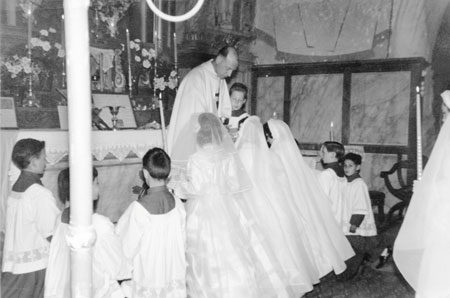
A PRIEST WHO INSPIRED VOCATIONS
One day, Father descended Rue des Fossés, towards a little house on the banks of Vanne River, where the parish’s cantor lived with his spouse and their children. Mrs. Velut welcomed Father. He looked at her a moment, grave and silent, then he said :
“ ‘ Madam, I have come to ask you something. ’
“ ‘ I know full well what you have come to ask me, ’ she replied, ‘ you have come to ask for my daughter ? ’
“ ‘ No, Madam, I have come to ask you for all three of them, for the good God. ’ ”
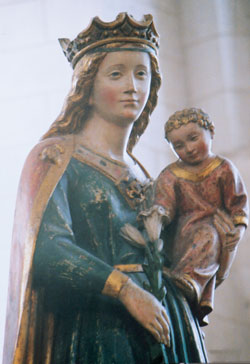
These were the first departures from the parish of young vocations that our Father had inspired for the convent or the seminary. There would be others. Of course, such events did not go unnoticed in a country village. All was known, people talked about it ; discussions were brisk and opinions divided. Therefore Father had to make a clarification :
“ If they left, it was at the invitation of their Lord and the Church. They have answered it, ” he explained in his sermon of October 4, 1959. Then he exhorted his parishioners to have confidence in the Church instead of speaking ill. The true reason is not the unhappy end to a love affair, nor ambition, but the banquet of eternal life, as St. Thérèse of the Child Jesus had understood it : “ O Jesus, ineffable sweetness, change all the consolation of this earth into bitterness for me ! ” He continued : “ What is this banquet here below ? The Eucharist. What is it in Heaven? The vision of God, in love. Only the pure, the believers can understand it, not the idolaters ; but are the joys of these latter really joys ? ”
On the following November 22, he gave them “ the secret of vocations : enthusiastic love of the Virgin Mary. ” This love enflamed his heart, but as though secretly. One day, a woman religious among the readers of his Letters complained about it : “ You almost have to do violence to priests to make them speak about their devotion to the Blessed Virgin. ” He replied to her with a magnificent Letter that raises, slightly, the veil “ of the grand regal secret of the Bridegroom and the Spouse ” :
“ As one touched to have detected such warmth in the voice of his friend, such gentleness in his smile towards the poorest beggar or the lowliest of His servants, would end up imagining what must be his friend’s goodness and tenderness for his spouse, thus it is for the priest whose ministry makes him the witness of the delicate and tender attentions, the ardent solicitations of God for the most modest of His creatures, senses what must be, in their nuptial chamber, in the dazzling centre of Heaven, the incomparable outpourings of the Lord and the Immaculate Virgin, Whom He chose for Spouse from among all the others. ” 4
MONK-MISSIONARY.
Father also invited missionaries who had returned to France to inspire vocations, prayers and donations. He had them welcomed into families and organised a big ‘ Missionary Day. ’ Thus, on Ascension Thursday, May 26, 1960, he received Fr. Trémorin, a Lazarist Father, parish priest of Our Lady of Donglu, in China. 5 Fr. Trémorin drove a truck in which parishioners could see a small missionary exposition with photos and explanations. The morning Mass was said for the missions and, in the afternoon, Fr. Trémorin gave a conference on China. The collection and subscriptions brought in 42,780 F that day, and the sale of books 6000 F. Father wrote in his notebook : “ Day ill-chosen, bicycle race. All the same, all went well in the morning and the room was packed in the evening at Pâlis. Transport from Villemaur must be better organised. ”
The following Sunday, Father drew the lessons from this testimony about the persecutions endured in an invigorating sermon that inflamed hearts and encouraged apostolic ardour :
“ You would think that such accounts would dampen enthusiasms. On the contrary, if the testimony dampens the enthusiasm of the superficial, it inflames the pure. Supernatural vocations are stimulated and strengthened by them. An imprisoned pagan said to an imprisoned missionary : ‘ After the storm, for the storm will pass away, we know towards whom we must turn : towards you, the missionaries, and towards the Catholic religion. ’ A point to reflect upon : if these countries find themselves miraculously freed from the Communist yoke, immediately there would be a need, not for a thousand, but for a hundred thousand priests and religious.
“ Our inertia is the cause of the loss of the world. ”
In this way, Father associated his parishioners with the life of the Church, in accordance with what he had written in our Rule : “ The brothers will know about her struggles, they will adopt her concerns, they will suffer from her ills, they will rejoice in her happiness. ”
‘ Her happiness,’ was for example, the taking of the veil of the eldest of the three young Velut girls at the end of her postulancy with the Servite Sisters, at Groslay. The ceremony took place on September 8, 1960. Father chartered a bus so that the whole parish could be associated with this joy. Of course, it was he who preached. On the return trip, he offered his parishioners a guided visit of the centre of Paris : Notre-Dame and the Sainte-Chapelle. Inexhaustible, he could speak without tiring to bring his parishioners to admire these treasures of royal and Christian France.
CATECHISM AND THE PARISH YOUTH CLUB.
In his Letter to Parishioners of September 1961, Father announced the reorganisation of catechism classes and the implementation of a ‘ little catechism ’ adapted to the youngest children.
“ … This is on the subject of the moral and religious education of your children. Something is hindering it, that my confreres and I constantly come up against since it is generalised and diffuse ; it is something that we do not know how to surmount because it results from so many causes. It concerns the irregularity, not to say the caprice, of their attendance at catechism, at church services and their practice of the sacraments.
“ Sometimes I blame myself for being too ‘ lenient. ’ Undoubtedly, in the beginning I had good reasons for being accommodating. There had been a certain lapse during the years of the late Fr. Besançon’s illness. We had to bring back the children who had become estranged for futile reasons ; we had to close our eyes to certain deplorable acts of indiscipline that could not be corrected abruptly. Knowing that I am more prone to severity, I preferred gentleness. I now notice, however, that to the detriment of the education of their children, several are taking advantage of this broadness of outlook that I showed. ”
As a result, he took measures :
“ Therefore, we must now scrupulously implement the diocesan regulations : three years of catechism are compulsory to be entitled to make one’s Solemn Communion and, starting on October 1, I want to enrol in the ‘ catechism for little children, ’ very well adapted to their age, all the children who go to school. Even those who do not yet know how to read, know how to listen and remember ! They will learn much, as in kindergarten, through pictures and songs. ”
This catechism class for little children was taught by devoted woman parishioners using the manual ‘ Miche de pain ’ (Loaf of Bread). Father attended to the three years of preparation for Solemn Communion. He gave a catechism lesson each evening from Tuesday to Friday in Villemaur. 6
Thursday afternoon was dedicated to the parish youth club. Devoted young women looked after the little girls while Father, whatever the weather, took his boys through the woods and fields where he enthusiastically ‘ led ’ games. The afternoon ended at church with a prayer or hymns. Sometimes, all these children were gathered in the presbytery for a filmstrip projection.
A class of music theory was held on Saturday, from 1 to 2 P.M. in order to initiate the children to Gregorian chant. At that time, Latin was the liturgical language. At Sunday Mass, however, Father did not fear to have an altar boy read the epistle in French from the rood-loft while, in a low voice, he read it in Latin at the altar. This was what he called “ pedagogical bilingualism. ”
During summer holidays, the children were invited, each in turn, to help out at the presbytery. There, they occupied their time usefully by doing small gardening tasks or by assembling the Letters to My Friends, not to mention the prayers that gave rhythm to the day. The oldest children came in groups and Father gave them talks or a spiritual reading.
As for Father’s sermons, the youngest children remembered his vigorous admonitions : “ If we abandon Algeria today, in twenty years, they will come to cut off our heads ! ” Oh ! Let’s hope that we do not abandon it ! In one go, they were in favour of ‘ French Algeria, ’ and against de Gaulle and his secret police agents. The following week, the recreation court of the primary school was enlivened by the shouts of the partisans of both camps.
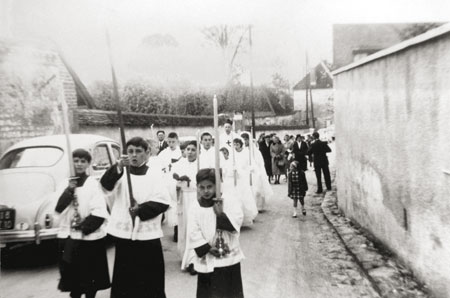
THE EDUCATION OF FAMILIES.
Nevertheless, it was the parents above all who needed to be educated ! “ To have children is but the first stage of a great mission : to bring forth the citizens of Heaven. Afterwards you must educate them. ” 7
At the beginning of 1962, Father initiated a series of sermons on the family and the Christian education of children.
“ A woman will be saved through motherhood, provided she perseveres in faith, love and holiness, according to St. Paul (1 Tm 2:15,) not forgetting modesty.
“ The father explains the reason for things ; he addresses himself to the intelligence : if Papa does it this way, it is because it is good ; if he says that, it is because it is true (responsibility !).
“ Mama teaches how to love God and virtue : she teaches how to pray (if she prays !). She models the soul of her son in her own likeness, a gentle but profound influence, because it is loveable.
“ a) God exists, the father believes, the mother loves… b) Truth and error exist. c) The reasons for behaviour. d) Good people and bad people : ‘ Life is not neutral, you have to take sides boldly. ’ e) There is the Church, the Fatherland, for which great deeds are done (veterans) and there is the hostile world… Conclusion : confirmation on this solid foundation of ‘ miles Christi. ’ ”
It was not long before such apostolic zeal brought results. Even the most opposed parishioners held their parish priest in esteem. This could be seen by the unanimous sympathy that they expressed at the time of a car accident that occurred on Sunday, August 20, 1961, between Planty and Pâlis.
Father showed his gratitude : “ Several tokens of your good dispositions touch me, and the Bishop himself was anxious to express his great satisfaction : your more regular attendance in greater numbers at Sunday Mass, your more general and ardent participation in Church hymns, the number of pilgrims for Lourdes and retreatants for Paray-le-Monial, the fidelity of men at prayer vigils. Those among you who want to do better can thus see what they can decide to do in their turn. One can always do better, and each time it is a joy !
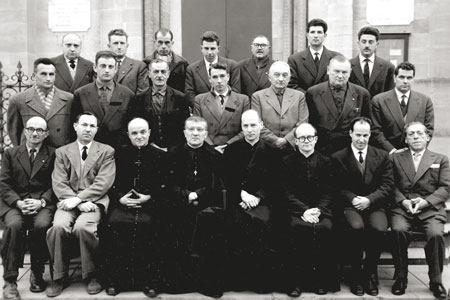
“ In another domain, in which good dispositions of the heart are also expressed in an obvious manner, I am referring to material generosity, you are making great efforts. There is general progress : you replied generously to our appeals in favour of seminarians, the Missions, Secours catholique (a Catholic charity organisation that assists the poor) and, quite simply, the ordinary collections, the proceeds of which go to the parish coffers. I do not know how to thank you also for the regularity and the useful abundance of the ‘ priest’s food hamper. ’ ” 8
Thus, a deep bond was formed between the parish priest of Villemaur and his parish that became more intimate, more “ mystical ” each passing day :
“ O my Church, my venerable Mother for thirty years, you began to appear to me in Christ as a young, joyful, confident spouse, and so ardent that I sensed that you were more enamoured than I of the perfection towards which I was guiding you. Such was our relationship as spouses, our romance, day and night, winter and summer, long hours of the priest in his church, devoted affection of the Church for her pastor, errands on the roads of our parishes. In the fields, the workshops, at the bedsides of the ill, at the exits of the schools, everywhere I found the thousand faces of my Church. All were our children : old people, men, women, practicing Catholics and opponents, and for all of them, each morning I poured out all Your Blood as a redemptive oblation, to all I gave Your Body as food, or at least Your Word. Occupying Your visible place, how could I have failed to love this Church with a bridegroom’s joy ? 9 ”
A DISCIPLE OF ST. THÉRÈSE.
“ For the coming year, I cherish a great desire, a project that I have entertained for a long time : to take a great number of you on pilgrimage to Lisieux ; to convey to you on the spot some of my admiration, my affection and my confidence in St. Thérèse of the Child Jesus, this very marvellous little saint whose statue is found in our three churches. Carefully prepared, this pilgrimage will be something magnificent and will not be forgotten… Start putting a little money in your moneyboxes ! ” 10
Since his arrival at Villemaur, Father had not concealed his ardent devotion for the little Carmelite of Lisieux. Each year, her feast was solemnised on Sunday, and it was the occasion for an ardent sermon woven with quotations of the saint, illustrating the account of her life and the explanation of ‘ the little way. ’ He wrote to the brothers : “ Sunday we honoured St. Thérèse of the Child Jesus here (a beautiful altar of repose in the chancel, the relics and the statue, flowers, candles, lots of devotion ; tender sermons… Yet had I seen that everyone was weeping, what would I have done ? I would have done likewise !) Well ! Without asking you, I entrusted to her all my vocations, all your vocations and I am relieved to think that She is looking after them, with the Virgin Mary. The burden is less weighty for me, truly ! St. Thérèse, however, is powerful and gentle… ” 11
He loved St. Thérèse, he understood her, he entered into her intimacy, and he was now drawing his parishioners to her, as this sermon of September 25, 1960 shows :
“ St. Thérèse of the Child Jesus : loved by all, secondary patron of France, of the missions… one day she will be a Doctor of the Church ! 12 Read The Story of a Soul : we will speak about it this evening. Her ‘ little way ’… which consists not in accepting cheerful things but painful things ! Read her life : what crosses and yet a perpetual smile ! Such is the love of God. Immense energy. Her ‘ little way ’… once again, it is not mediocrity, but confidence in grace in order to attain the grandeur of holiness. Conclusion : is it for us or for Carmelites alone ? It is for us (I will talk to you about it this evening). ”
On October 8, 1961, he began his sermon thus : “ The great sadness : not to be saints. The great hope : to become saints. The great joy : to have known and spent time with saints ! at least in books, our family. We will go to Lisieux !! ”
CHRIST’S INCARNATION CONTINUED.
Christmas of that year, 1961, was unforgettable and profoundly marked the parishioners. As for Father, see the account that he made of it eight years later :
“ Why was it that the most beautiful of these Christmases was almost the last one, in any case the last one of this Catholic Church, faithful to her Lord, self-confident, unanimous and ardent, from before the dislocation of the Council ? It was in Villemaur, in 1961. Confessions had been so numerous, while the Brothers chanted Matins in the chancel that I had just the time to recite them in an interval. To the sound of the joyful bells, we advanced in procession towards the crèche. Donning a cloth of gold cope, I carried the Christ Child in my arms on a delicate lace. Our cantor intoned “ Minuit, Chrétiens. ” This was how the senses were alerted and the imagination focused. Does that not seem common ? That is true, but the country priest is also part of the common people, or he becomes so out of love. Then Mass began : Dominus dixit ad me… Everyone enthusiastically sang Dumont’s Royal Mass.
“ Next came the important moment of the sermon. I always ascended the pulpit and, from above, like a father and a leader, but very aware of being only the minister of the hierarchical Church, I had the formidable responsibility, in ten or fifteen minutes, of both recalling the mystery and making believing intelligences sense its truth, its height and its profundity. Finally I had to lead hearts to the fervour of holy devotion, to the love of Jesus that would confer on Communion its entire fullness. I preached with all my soul, without straying very far from the text of the Gospel. I saw clearly – without vainglory for priestly joy dismisses the temptation of it – I saw that my children were following me and were very grateful to me for being close to them through my words and through my whole life, and for being the dispenser of the sublime riches of the Church among them. At such moments, how sweet are the glories of priestly celibacy and the memories of the laborious years of the seminary and how touching the modest function of a priest in a country parish !
“ Then came the Offertory. Once again we were with the altar boys at the crib. I saw the whole Church filing past, everyone bringing his Christmas gift for the poor of the Sahara. ‘ Did you say the Sahara ? What is the meaning of this irruption of the Targui and of Harratins in this village of Champagne ? ’ ‘ It is the charity of the Catholic Church, your Excellence. Since our seminarian, Brother Bruno, is presently an officer in a meharist company, the only Christian among the very wretched Muslims of the isolated Igostene oasis, where he serves as a primary school teacher, each of our parishioners bring their package for these distant members of Christ. ’ They filled the baskets to the brim with them. The altar boys were no longer able to carry them. Before offering their package, however, each of them approached and devoutly kissed the Christ Child, fragile and touching, Whom I presented to them. Oh, yes ! When the donations arrive there, this offertory will announce Christmas to the poor. Everyone from Villemaur was present, but also from Pâlis and Planty. Later on, after the sacred rite of the Holy Sacrifice, more than two hundred came in waves, invading the chancel to receive Communion, which was a source of joy ! ” 13

Yes, it was Jesus who came back to become incarnate on this blessed Night in the humble church of Villemaur in order to preach His Gospel by the ministry of His priest and to celebrate His earthly nuptials with His Church, in expectation of the eternal Nuptials.
THE HEART AND THE CROSS.
During his priestly retreat of 1959, our Father put a ‘ confession ’ down in writing in his book of personal notes, which escaped destruction. It reveals his inmost heart. Going back over his past life, he wrote :
“ First of all there was this sum of natural gifts and circumstances of family, education and manifold experiences in which many people saw tokens of a predestination for an ecclesiastical work. Yet above all, there was this continual shower of inner graces, all destined for the sanctification of my soul, so much so that it always sufficed for me to be willing to avert my gaze and my heart from creatures, to be silent and pray a short while, in order for You to appear to me with the attentiveness of a tender love, to console me, delight me and show me once again a marvellous future of holiness.
“ Yet today there is a new fact, the final reproach to my tepidity, to my infidelity ; there is this ultimate proof that Your love greatly exceeds my egoism : my entire ministry bears fruits that are too abundant. While I am still a sinner, You are acting as though I were the saint that I ought to be already through Your grace. Thus, I am forced into either true, faithful and generous love, or else hypocrisy that will one day drag all my entourage into the abyss with me ! ”
Jesus replied :
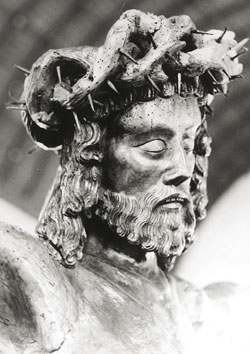
“ My son, the least of My little brethren, but a beloved brother as you can see by the incessant proofs that I give you of My tenderness : when you escape from yourself, when you sacrifice your egoism and turn your back on the proud thoughts that trouble you, your heart will awaken to a threefold tender and devoted love : love of My Cross, love of My Heart and love of My Host. These are inseparable realities that will reveal to you the whole mystery of My Incarnation and will teach you how to be a universal brother, a man crucified, a man sacrificed, a man consumed. Look at My Cross and consider My sufferings, listen to My Heart and console Its sorrow at not being loved, eat this Host and never leave Me again ! ”
The remainder of this book will show Georges de Nantes fulfilled this vocation in fifty years of a life modelled on the example of Fr. de Foucauld, “ which is nothing other than a commentary for you of My Life, of My Gospel, ” said Jesus, in this meditation based on the retreat that Charles de Foucauld made in Nazareth (1897) :
“ What is a glory for Me is your self-renouncement, your slightest sacrifices, the pain of silence and daily emptiness. When you were left to rot, when the Demon tempted you and you fled to the church, that is My glory. When you carried out your daily routine as parish priest, full of prayer, sacrifice and small acts of apostolic charity, that is My glory. ”
Here is the resolution that the parish priest of Villemaur made :
“ In my inmost heart, in the small blessed and concealed corner where Your Providence placed me, I am going to impregnate my deeds and thoughts with the gentleness and the self-effacement of Brother Charles of Jesus ; as for the rest, I will no longer attach any importance to it. ”
Nevertheless, with the Second Vatican Council, after the abandoning of French Algeria, “ the rest, ” would soon overtake him, but as a cross to be borne out of love.
(1) Letter to My Friends no. 220, Epiphany 1966.
(2) Sermon of October 18, 1992.
(3) Since the revenue of a parish priest in France is insufficient, the families of the parish take turns providing him each week with a hamper of food.
(4) Letter to My Friends no. 69, May 1960.
(5) This Lazarist missionary, who had been the confrere of Fr. Lebbe in China, revealed to our Father the imposture and the bad influence of this “ pioneer of the new missiology. ”
(6) Now available on DVD, French version only : “ Quarante Leçons de catéchisme ” (S 88). Or on the French website.
(7) Notes for the sermons of February 11, 1962.
(8) Letter to Parishioners, September 1961.
(9) Mystical Page no. 54, p. 271.
(10) Letter to Parishioners, September 1961.
(11) Letter of October 10, 1959. Archives of the Community.
(12) In December 1962, in a triduum that was preached to the Victim Nuns of the Sacred Heart, in Marseille, our Father spoke of St. Thérèse of the Child Jesus as “ our great Doctor of the Church, for I hope that one day this is what she will be. ”It was thirty-five years before the Church recognised her as such.
(13) Christmas 1969, supplement to the CRC no. 27.